Search Results for 'Eoin Dochartaigh'
8 results found.
‘I am an international socialist,’ shouted Pádraic Ó Conaire
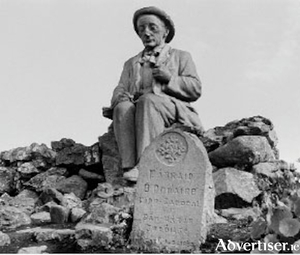
In his famous statue of the writer and Irish scholar Pádraic Ó Conaire, the sculpture Albert Power presents a brilliant likeness to the man Galway knew as he went about the town. Liam Ó Briain, a friend and fellow Irish enthusiast, remarked that Albert Power had captured exactly how the man looked. Meeting Ó Conaire in town one evening, Ó Briain remembered that he looked in reality as he is on the statue: ‘the stick in his right hand, the little hat on his head’, a face that could show his ‘puckish humour.’ *
Michael Collins remembered a debt for ‘measly £10’
An Taibhdhearc, Ireland’s only Irish language theatre, situated in Middle Street, the very heart of Galway, grew out of a conversation between two remarkable men, Professor Liam Ó Briain and Dr Séamus Ó Beirn.* Both men, passionate Irish speakers, believed that a lively Irish language theatre would promote Irish in an imaginative way.
Friends in strange places.
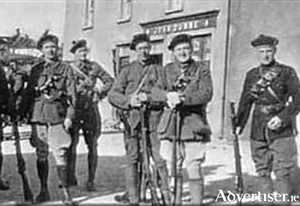
Our friend ‘Captain H’ who had ingeniously planted a dictaphone in the confessional under the stairs in the Town Hall prison, was up to his old tricks again. Somehow he had managed to plant a ‘friendly’ Sergeant Gates who chatted and smiled, and was a friend to all, and dangerously caught numerous snatches of conversation from the hundreds of prisoners within. These were reported to Captain H.
A prison drama in the Town hall
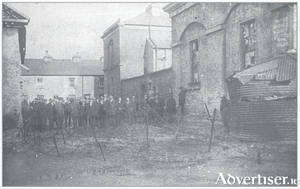
November 1920 was the most vicious month in the War of Independence. Murder and mayhem were commonplace. The authorities reacted with vigorous severity. There were shootings and public beatings, buildings and homes burnt, and printing works wrecked. There was a sweeping roundup of the usual suspects, numbering in their thousands. The old gaol in Galway, and gaols throughout Ireland, were full to bursting point.
‘Muishe, is it yourself that’s in it, Mr O’Brien?’
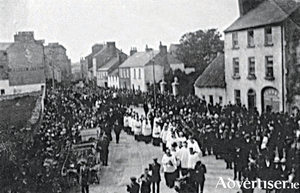
Liam Ó Briain, professor of romance languages UCG, was arrested by the Black and Tans on November 21 1920. He was taken to the RIC barracks, at that time in Dominick Street, and then up to the army barracks at Earls island, where he was identified. Other men arrested stood in line. They were watched by ‘pompous young officers’ who, with ‘a hand on their guns’ ‘sniggered’ at the standing prisoners. They went up and down pulling hands out of their pockets. Ó Briain, in his recently published essays on his experiences,* did not sound too concerned. He was well known to the police authorities. Because of the murder and mayhem during the week of his arrest, he must have been expecting to be picked up.
Grief and despair on Galway streets November 1920
Sunday November 21 1920, known as ‘Bloody Sunday’, marked one of the most significant events in the Irish War of Independence. The day began with an IRA operation, organised by Michael Collins, to assassinate the so called ‘Cairo Gang’ - a team of undercover British agents, working and living in Dublin. IRA members went to a number of addresses, and shot dead 14 people including nine army officers.
Liam Ó Briain, Irish rebel
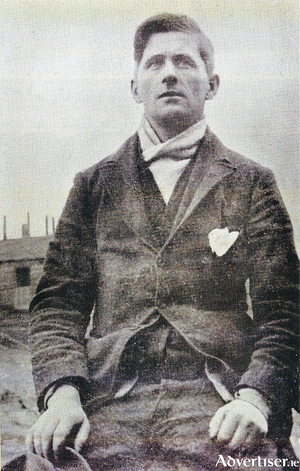
Liam Ó Briain was born in Dublin in 1888. In 1916 he helped print the Proclamation and he served with Michael Mallin in the College of Surgeons during the Rising. He was subsequently interned in Wandsworth Prison and in Frongoch. In 1917 he was appointed professor of romance languages in UCG. He was jailed in Belfast in 1919/20. When he returned to Galway he was appointed as a judge in the Republican Courts In late 1920, he was having dinner in college when he was arrested by the Black and Tans, and jailed for 13 months in Galway and the Curragh. Some of his experiences in prison are vividly described in a recently published book.
Liam Ó Briain - Memories of the Easter Rising
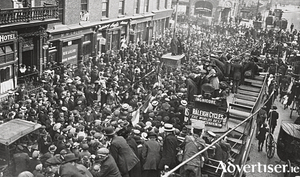
One of the real benefits of the the centenary commemorations of 1916, is the amount of research and new material that has been published on the background to the Rising, and in particular on the personalities of the men and women involved.

